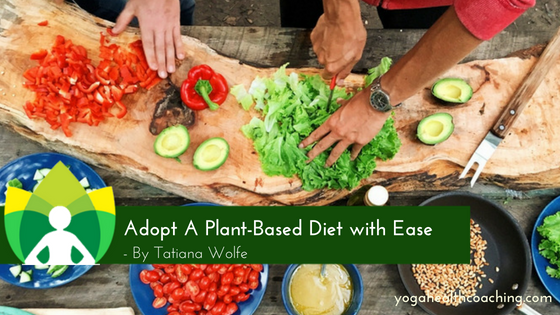
Part 1: Adopt A Plant-Based Diet with Ease
Knowing what to eat to maintain or achieve good health has never been more confusing than today.
Information Overload
There’s so much information out there about food, nutrition and the perfect diet. It’s easy to become overwhelmed and confused. One thing that everyone can agree on is that a plant based diet is the most beneficial diet for humans to thrive on. It’s ancient wisdom and common sense.
Ever since I can remember, I’ve had a weak digestive system. By trying to heal myself and achieve better health, I became somewhat of an expert on adopting a nutrient dense plant-based diet.
I want to share tips that I have learned along my journey and want to share how you can make better and informed decisions when it comes to what you feed your body.
I was a vegetarian for about 6 years. At the time, I didn’t know much about nutrition. I decided to become a vegetarian to uplevel my health. When I first started, I ate a diet full of sugar and processed vegetarian foods.
That diet had nothing to do with being healthy. As I started to learn more about nutrition, I began to incorporate a variety of vegetables and plant foods into my diet. I began to understand what a plant-based diet really was. I’m no longer exclusively vegetarian, I have come to the conclusion that my body needs some good quality animal-based foods. But that doesn’t mean I no longer eat a plant based diet, on the contrary, I eat more plants now than I have ever before.
What Is A Plant-Based Diet?
To me, the definition of a plant-based diet is just that- a diet based on plants. This does not mean exclusively plants, however. While some people could thrive on a diet solely composed of plants, other people like me, need the help of animal based foods. It is undeniable that a diet largely composed of plant-based whole foods is the most beneficial for our bodies to thrive and receive the all the nutrients that it needs to function best. Whether or not you eat animal-based foods, fill most of your plate with unprocessed or minimally processed good quality plant foods. This rule is essential to achieve optimal health. To give you an example, my dinner plate is usually filled with 75 – 80% plant foods. The remaining portion is some kind of animal based food, like good quality wild-caught fatty fish or organic pasture raised chicken. Many days a week, my plate is filled with a 100% plant-based foods.
Not So Fast!
You might think that the process of eating plants is pretty simple and straightforward — fill up your dinner plate with a bunch of kale and sprouts and poof your health and body will shine and improve magically. Nope. Here are a few tips on how to get the most out of your diet.
Eating Locally And With The Seasons
These days, we have almost unlimited access to all kinds of foods, from exotic fruits to vegetables, herbs and even meats and animal based products coming from all over the globe.
Thanks to modern transportation and chemical preservation of foods, we have been able to enjoy blueberries in december, cucumbers in january, and tomatoes in February. What many people may not be aware of, is that most produce gets transported great distances. It’s picked from the tree or vine UNRIPE to prevent them from spoiling during transit. The longer a fruit or vegetable sits after being picked, the more nutrients it loses. Not only does your body suffer from the long distance it travels from farm to table, but so does mother earth.
Natural Foods Are Seasonal Foods
Having unlimited availability of foods makes us unaware of the seasonality of the food we are eating. What is naturally grown in nature during the current season gets lost and this separates us from our original ways of living in tune with nature.
We get disconnected from our ‘source’ and our instincts. When we respect nature’s rhythms and live in sync with them, we become healthier by allowing nature to support our needs with her inherent and infinite wisdom. We are meant to eat foods that are in season. Fresh foods, organic and real (in all sense of the word), harvested not too long before they are eaten.
Nature knows Best!
Eat with the seasons for optimal assimilation of nutrients and to support for your bodies’ seasonal needs. The Fall offers tubers, squashes and variety of plants foods that can either be eaten immediately or stored in the pantry for later use.
Nature understands the scarcity and austerity of winter and spring seasons, providing the perfect foods for the season. The light, young and leafy plant foods of early to mid spring help us lose and scrape away all the weight gained and toxins stored from the seasons prior. The high sugar, high carbohydrate, cooling and watery produce from the summer are there to keep us cool and hydrated and provide all the energy that such demanding and productive season requires from us.
A Diet that’s Downright Dirty
Many people might not know this, but soil contains vast amounts of microbes that actually change with the seasons, so when we eat the plants we are also ingesting the microbes they acquired from the soil they grew in, helping us diversify our microbiome. If we are eating with the seasons, our own gut microbiome will also seasonally change which will positively impact our health.
Please comment below on how you fill your plate, what works and what doesn’t?
Stay tuned for Thursday’s blog-Part Two of Adopting a Plant-Based Diet, I have more to share with you, especially if you have weak Agni.





